|
My sister recently sent me a box which included this photo, and numerous things that I had given my mom over the years: photos of my kids, notes, a Mary Cassatt print titled “Young Mother Sewing”, an anthology of plays that includes one of mine. My sister has been slowly dispersing my mom's things since she died last summer. I sat on my living room floor looking at all those artifacts thinking how much they don’t matter, and yet how much they mattered once. There was also a big clump of bubble wrap with something inside. I started to tear at it and I knew. My sister had told she would be sending this along . . . a portion of my mom’s ashes in a Tupperware container.
I had never seen this photo before, it’s Christmas morning, 1963, the wrapping paper confirms. That is me holding up the doll. My mom’s face, obscured, turns toward me. My sister Cheryl is busy to the right. My sister Michele is smiling up at us. The landscape painting, barely visible on the left, was hung prominently in every house my mom lived in. All the living rooms flash through my memory now. My mom’s robe is chenille, common back then, but now harder to find. Shockingly, though she doesn’t look it, my mother is pregnant and will give birth to my brother in three months. I still wrestle with that cowlick on the back of my head. My father is the seer, behind the camera. I don’t remember this moment, of course, far too young, but I still feel the same. It’s extraordinary -- Mom, see, let me show you -- and now she is gone. It’s absolutely surreal and a fact. Time has taken on such strange and profound meaning this past year. Like a lot of us I vacillate between frustrated inertia and frantic activity toward some unknown purposeful feeling. Time is so precious. There’s so little left, but just let me sit here a little longer and stare. I struggle to move my body onto the next thing. I watch birds a lot. I was thinking last night about the other photographs I have of my mom, not many, not many were taken, and she was also shy, often standing to the side or in the background in photos. She watched, more than she participated. She worried. She considered before she acted. She held back. To her I know I seemed like a doer, she would say so, always busy, always doing many things at once, school, work, theater, busy, not stopping. I like/liked it that way. But I so often worry and stand back and consider. More than she knew. Lately I feel as though I’m watching life, waiting, not sure how to step in or move on. Is it the state of the world, losing my mother, getting older, struggling to write, be creative, and finish projects . . . all of the above? I could feel my mom’s reticence throughout her whole life in my bones last night as I stared at this photo looking for something, examining my own reticence. My whole being is trying to make contact with her these days. I wish I could see her face in the photo and how she was seeing me, but it somehow follows that I can only get a glimpse. I don’t know what I’ll do with her ashes. It was a kind gesture of my sister to hold some back for me since I couldn’t be at the funeral, but now I’m overwhelmed with the responsibility, the permanence of whatever decision I make. Before my father died 27 years ago (he was ill and knew it was coming), I asked him to tell me something, anything about what he wanted. He was reluctant, but finally pointed me toward the cemetery near where he lived in California and said he wanted to be under a magnolia tree. Shortly after that talk he died, and my brother and I found ourselves walking around the cemetery with a salesperson. We told the man about the magnolia tree so he took us to various spots that had one. My brother and I would stand on the spot and look around and try to decide if it was the right place . . . for eternity. It was such an absurd ritual. We both knew it at the time and kept giving each other looks and laughing to get ourselves through it. Now the magnolia trees are blooming all around the Bronx and all I think of is my dad and wish I could stand in the spot where he is buried, and somehow feel I am with him. What would my mom think about a part of her being in New York forever? It wasn’t a place she loved. Perhaps the ocean is best, or under the rose bush in the garden at the end of our street, or beside a magnolia tree. The Tupperware container is a room away on the shelf while I write this. You showed up in my dream last night, blonde and younger than you are now, younger than I ever knew you. It was a long, meandering dream. I was hanging art with two other people in a new place where you and I would live. You walked in the room, hugged me tight lifting me off my feet. I can’t remember the rest, except me asking you a question about why something . . . and you smiling down at me like the sun, direct and open, and saying things are the way they are because of this. I knew you meant this feeling between us that hangs on and on. The dream slowed down and we hovered in that feeling, remarkably tranquil, and I sensed a half awake/half dreaming truth, or a hope, that you are out there somewhere feeling this going on like I feel it. But I woke up questioning that, thinking it’s just me carrying this on in my imagination, and then a flood of humiliation (I certainly can’t trust my own dreams). You’re long gone, never thinking about this again, which of course I don’t really know. But why should that matter even if it is true? You have a permanent place in me. It’s a lovely room mostly, but I’m not grateful for it. I’ll enter it occasionally, but then I’ll be reminded that love, unspoken, thrilling, cool love has moved on and that feral little girl starts stomping around, pulling out my hair, so I leave. In actuality, it was beautiful to see you again up close in my dream after so long with that smile of yours that seems to know everything and not question everything the way I do. Why not just sit in that room with you, and me, and enjoy it? I spent so much time literally sitting in my room fantasizing as a kid I’m sure there are neural pathways in my brain carved hard and deep that I travel now even when I don’t know I’m traveling them. Lately I ask my husband or daughter a question about some mundane, but necessary detail, they answer, and a few minutes later I can’t remember if I asked it or not so I go back and they smile kindly and say “yes dear”, “yes Mom, you just asked me that”. My mother died of Alzheimer’s so I worry, but I actually believe the problem is I reside between here and the murky interior world so often I’m not really listening. Rocking and disappearing into imaginary places started when I was very young, about four. But it was around the age of 12 that I got serious. I began to construct my future life in the gold velvet rocking chair in my room above the garage in a new, flat, spare, sad, housing development in the Denver suburb of Littleton where my newly married mother and stepfather had moved our family. The record player was my way in . . . I put a record on, sat low in the chair, and rocked and listened, and floated off. The visual imagery that would come to me was so vivid and enthralling; I didn’t see the room I was in anymore. I was grown up. I was beautiful and I was free. I was living a large life. Mostly I was great singer because that’s how I could leave the room best, singing along.
I took that gold velvet rocking chair and the rocking ceremony and my flourishing interior life on to my first apartment and dull job right out of high school and to the next one and the next one through my late teens into my early twenties. The rocking and pretending subsided when I found the theater and my exterior life finally flourished – acting, a surprising way of actually being real. I didn’t rock for a long, long time, but I did still disappear into my hard comforting neural pathways far into adulthood, usually as I fell off to sleep. But then, when middle age was upon me, I found the stories and future fantasies had morphed into fears and worst case scenarios, so I started avoiding my interior life, avoiding being alone, avoiding riffing, avoiding imagining, I couldn’t be trusted. I would only scare myself and make the anxious feelings worse. It was a strange place to be, running from myself. It has taken many years to begin to untangle it all. I work hard to stay in the present, being here with whatever the truth is. I still catch myself, sometimes numerous times a day, steering blindly into the worry, and then I steer hard again the other way to come back. The dream of you surprised me it was so much like young me finding the imaginary place that used to be such a comfort. Maybe I'll try stepping into our room more often, sit the feral little girl on my lap, and rock her. The interior life v. the exterior life, is one really better, or just more acceptable. 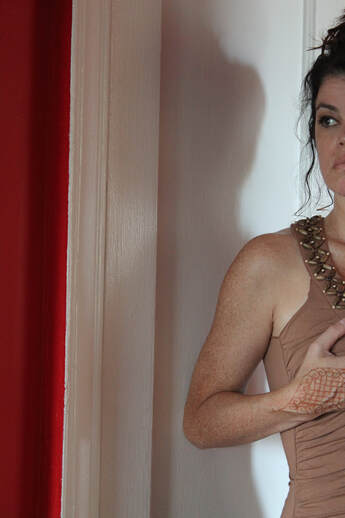 Self Portrait No. 9 (2013) Self Portrait No. 9 (2013) I became aware somewhere in my mid-30’s, around the time I had children, of a strong sense that there are two parts of me, distinct and separate, and that I had/have not let them both live simultaneously. All of my writing (even prior to that time) incorporates this theme, living with an underground other. This is why I write, I think I've been in search of her all this time. This is what I believe drew me to acting in my early 20’s -- I wanted, still want, to play characters who help me peel back the layers and peek deeper inside. I have memories from childhood of moments of insight, a nagging knowing, that there is a distance between me and me. Maybe I was born this way. I think the trauma of my childhood that sent me hiding intensified the feeling of an internal life that didn’t have a voice. The pandemic has certainly intensified my daily introspection. In these past few months I understand more and can see far back over my shoulder how much and for how long I have wanted to let myself fully be. Or let her, the other, fully out into the light. I don’t think I even know what that will mean, or how it will feel, or even how to do it. I’ve been afraid of what is there for so long, and I judge what I cannot see or fully understand. But I also feel that underground other holds some of my confidence in her clenched fist and maybe even some joy. On the one hand I’m an artist constantly digging for the truth, on the other I employ a contradictory strategy to get through the day. I quiet the rumblings from underneath and soften my sharp edges, but it’s not what I really want. I like the edges for the most part. I’m opinionated, strong-willed, impulsive, laugh really loud, and can also be exacting, prickly, easily hurt. Out of fear I have not only worked hard to soften the edges of myself, but of my life, to keep the painful hairpin turns at bay, get rid of the jolts -- create a life that would reflect back to me a peaceful elegance. It’s all part of a story of who I wish to be that doesn’t serve me. Planning my life, and not listening to the nagging knowing, the underground other, was going to keep things on track the way I thought I wanted. If you asked me, I would have given you the “correct” answer, I know I can’t plan, life happens, but I am always planning, controlling. I have never been one to ride the wave of existence or even acknowledge that I’m on the wave. I would tell you no, I’m standing on the shore quite stable. And I’ve worked hard for that. Ha! In response to this nagging feeling of bifurcation, I started a self portrait photography project a few years ago in search of me, in search of the other, the thought being if I can take the right picture, the true picture, I will appear whole to myself. I have gotten glimpses of that person in various shots, something feels truer, righter, closer . . . but the search is ongoing. I don’t know that I’ll ever do anything with the photos. I’ve posted a few online here and there. I’m not sure it has a context for the world outside of me. As I look back on the hundreds and hundreds of shots the process has not been as much about revealing myself as constructing a self, again trying to put forth the self I thought should be there, not letting myself be, being a bad actor as it were, trying to smooth out the edges. Again, the theme of hiding and simultaneously wanting to expose. My parent’s internal lives were a secret to me. I can only conjecture based on their choices and a little bit they shared. They weren’t used to talking about themselves that way and certainly didn’t ever offer up their truest reflections. They are both gone now, but I continue to wonder how they felt about themselves, what they really wanted, how did they feel about how things ended up in their own stories. I miss them terribly. Yesterday I caught my reflection in the mirror and I was struck that I looked “older”. Then a concrete image appeared in my head of me standing across a chasm yelling to my younger self who couldn’t hear me. She was leaning forward, trying to hear me, but my words were not reaching her. What did I want to say? I don't know, but the feeling was intense, a desire to be with her, kindness toward her welled up, and an understanding that I was moving on, leaving something behind. Her effort to blend in and become unremarkable has been herculean. My sisters Michele and Cheryl, and my brother, Ken, and I were on a Zoom call Saturday night to plan the online memorial for our mother, who died the end of August. There had been a small funeral in Denver in September, but we were now getting around to planning the online service so more people could attend in the midst of a pandemic. On my last visit to Colorado in December, 2019 I had gone to the cemetery across from our old junior high school. Our mother had Alzheimer’s and she was declining. No plan had been made for a service, and I wanted one. I rarely took control of anything around my mother’s life as our stepfather had complete control and was an immovable force. I wanted a place where I could visit her, quietly, alone and know part of her was there. I wanted something permanent. The cemetery gave me the information about internment of her ashes in the ground. I told my stepfather this is what I wanted, for some of her ashes to be put there. He said no at first, but eventually relented. So my siblings were there at the masked, socially-distanced funeral that I had wanted while I was on Facetime 2,000 miles away in my living room in New York. At least it didn’t cut out. I wrote a passage that my brother read out for me. Cheryl wrote a eulogy that included all the events of mom’s life, all the good things. She didn’t write about the havoc our stepfather created in our lives, and continues to create, and how we often (sort of jokingly) refer to our family, as not one. Michele's contribution was choosing the pastor from her church who officiated. Like so many other families who have had funerals during this pandemic there was no process of people gathering, absorbing each other’s grief, remembering, bringing food, and just sitting quietly together. I sat in my apartment frozen, stymied, wishing I was there, feeling like a coward for not getting on a plane, and feeling like a child for thinking that indulging my feels and traveling would even be a good idea. Michele, who is mentally disabled, lives in the same assisted living facility where our mother had lived for the past couple of years. Michele had lived alone since her early 20’s, but in the last year and a half, now in her early 60’s, she has needed help, so she moved in there. Since the pandemic began Michele has been primarily living in a state of isolation. She was able to visit our mother before she died, but those visits were isolating in themselves as Mom really wasn’t present anymore. The facility has gone through various phases of lock down, allowing outside visits, not allowing them, and quarantining all residents in their rooms. At this moment, November, there are some cases of Covid in the facility so Michele is quarantined to her room, and understandably feels oppressed by the restrictions. On Saturday night while we were all sitting on Zoom together a health-aid came in for the routine temperature check and Michele’s was 102, alarming to say the least. Michele didn’t look like she had a fever, she wasn’t lethargic or flushed. But her chromosome abnormality which caused her mental disability and a variety of health problems throughout her life is tricky. Michele could have a health problem that does not register in a predictable way and she also has a flat affect that wouldn’t necessarily let us know how she was feeling. The health-aid left quickly. The four of us continued talking. I was hoping it was a mistaken reading and that was that. The health-aid was back in minutes with full PPE this time and said she needed to take Michele’s vitals. The aid saw the screen with the three of us watching and partially closed it, but Cheryl and Ken and I could still hear everything going on. Oddly, we attempted to carry on our conversation about Mom’s memorial, the way people try to act like nothing horrible is happening when it seems like it might be. Michele came back to the computer and the aid left. We didn’t get any information about her vitals. Cheryl suggested Michele take off the heavy bathrobe she had on over her clothes. Ken suggested Michele go and get the thermometer she has in her bathroom. Michele’s balance and strength are waning and it takes quite a few seconds for her move up and out of the chair and then another minute or two to cross the room. This time we all sat silently. She came back, rolled the thermometer over her forehead and told us it read 100 point something. Oh, that’s a relief. Then two health-aids were back saying Michele had to go the hospital now -- their voices urgent. Michele immediately got shakey and started to panic. Anger seized her. I know her foremost thought, because she had told me the rules many times, was that if she left the facility she would have to quarantine even longer when she came back. Michele has needed help all her life. She has learned to follow instructions. She hates other people telling her what to do, but because she knows she needs help she will go along. She lives this contradiction every day, and clearly articulates all the time how maddening it is. I never know how to comfort her. With the health-aids standing nearby saying “we have to pack you a bag”, Michele stared at us on Zoom and said, “Well, I guess this is good-bye for the last time!” and angrily disconnected. I don’t believe she meant it the way it sounded. 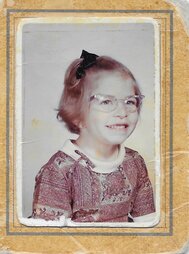 In 1968 Michele was 11 years old and struggling through the fifth grade. She was sent to the eye doctor for better reading classes to help her in school and she ended up at the hospital undergoing extensive testing. A few days later our mother was told by a team of doctors that she was "mentally retarded" and would never get beyond a second grade level. Michele then skipped the 6th grade and immediately went into a public junior high school (the one across from the cemetery that all four of us attended) where they had Special Education classes available, “dummy classes” she would say. In 1985, at the age of 29, chromosome testing revealed that Michele had a deletion on one of the chromosomes in her 18th pair or 18 P Minus Syndrome, and that this was, indeed, the source of her handicap. She was my parent’s first child when they both were in their early 20’s. Their chromosomes were tested and found to be normal. A random genetic mutation had caused Michele’s disability. 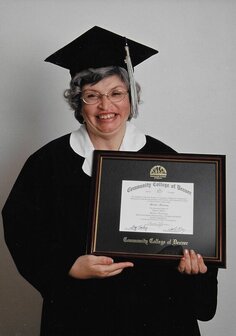 Michele got way beyond the second grade, she earned her GED, received an Associate Degree from the Community College of Denver, became an outspoken advocate for the disabled, and held down various jobs throughout her life, none of which fulfilled her. She wanted very much to earn her own way. Michele's character has been defined by her relentless desire to participate in the world in the same way most people do, particularly her siblings, and her full awareness that her disabilities make that impossible. Her effort to blend in and become unremarkable has been herculean. Unquestionably, her family’s desire, bordering on insistence at times for her to become one of us, especially when she was young, combined with societal pressure to be normal, has had a tremendous effect on how she envisions herself not fitting in. It has been a difficult road for all of us to navigate, and we’ve often failed to do right by her. When should we expect the same from Michele as we would from anyone, and when do we accept her inability to be or do the same and help her redefine the standards or norms? When do we in the name of fairness and possibility present the world as a level playing field for her to enter into, and when do we point out the insurmountable obstacles? In the midst of all these conflicts and contradictions she is, of course, the teacher with the real knowledge. In her presence honesty is all that is required, not because she is childlike or unintelligent, but because anything else would be disrespectful. She lives with the conscious reality of her handicap every day. She never escapes it or denies it. There is no need to hide from her, impress her, manipulate her, seduce her, seek her approval, or do any of the things that often take place between family members, whether close or distant. And in this act of peeling away any protective social armor I find I arrive at a unique place within myself that I only experience with her. There are no doubt greater tragedies than being born with a handicap like Michele's. Nevertheless, the day to day battles she must fight to stay afloat have both held up and worn down those witnesses around her. She, however, regardless of our reactions and her own struggles, continues to carve out a place in society. The piece of Michele’s 18th chromosome that is missing is utterly random, so how her disability manifests is varied. She has above average intelligence in some areas and not in others. She can be emotionally astute and then completely baffled about people’s behavior. Her feelings can overwhelm her and in some cases she’ll respond utterly unemotionally. But I did know from experience, she would be terrified going off to the hospital alone. Cheryl and Ken and I sat in our individual homes and waited for news from the hospital. It took a good three hours. All I could think about was that she was alone (again, like so many others who have been rushed away into the nightmare of Covid solitude). Isolation gripped me. I was alone inside myself with Michele. It didn’t matter that my husband was in the room. I got no comfort from his sympathy. Desolation was all I could register. It was hard for me to believe under the circumstances Michele did not have Covid, and I knew that it would take a miracle for her body to fight it off. Cheryl lives closest to Michele so she was in touch with the hospital. They called Cheryl to come and pick her up. They didn’t find anything seriously wrong. They were not utterly conclusive about Covid, however. She had been tested where she lives and the results weren't back yet. Why had the people at the assisted living facility panicked and sent her to the hospital . . . we know why. For most of our adult lives our mother was Michele’s best friend and caretaker. Now it is our turn, long overdue. I talk to her almost every day since Mom is gone. The pandemic is unfathomable to her, and she often feels like it is happening only to her. She hates the food she gets in Styrofoam containers brought to her room, usually cold and over cooked. She loved the spacious, pretty dining room where she used to be able to eat with other residents. She hates that there are no longer activities to do. She mostly hates she can’t have any visitors. I tell her how I feel trapped by this pandemic, how so many people do. It doesn’t really sink in. I think from her point of view, her sister who left long ago to pursue a life in New York who lives with a nice husband and was able to have children, has no clue how she really feels. I’m afraid she’s right, but I have to keep trying. I have to stay on the line. I can see my mother’s strong back, head down, long dark hair, shoulders rounded, sitting at her sewing table in the basement. My memory is not the best, but that image is frozen, she spent so much time there her silhouette is firm in my mind. I would sit next to her or find something to do in the room. My father built out the entire basement of our post-war ranch house. In one corner he made a long sewing table out of plywood and painted it white, it was always a bit rough, with an entire wall of peg board above it for thread and tools. Her sewing machine sat to the right side of the table. She sat in a folding chair.
I have begun sewing again. I made masks for my family and a few friends and then the neighbors. Something to do with my hands during the pandemic, get out of my head for a while. And then I found I liked it, so I made a skirt. My mother taught me how to sew when I was a girl, the ins and outs of dealing with a pattern that they don’t put in the instructions, tricky fabrics, knotted bobbin thread. I can see her with straight pins sticking out of her mouth, the tape measure around her neck, as she worked on pinning a pattern or a hem. I still have some pieces of clothing I wear that she made for me over thirty years ago: a brocade jacket, and a flowing shirt with French cuffs and a ruffled collar. She made my prom dress, a rust-colored sheath that my oldest daughter wore to her prom. My mother was a gifted seamstress. She took it for granted. It is something most women learned in her day, but she elevated it to the art of a craftsperson, a fine tailor. When I was a kid it was often cheaper than buying clothes, especially if you needed a special dress. Now it is more expensive to sew a summer dress than buy one, but I’m doing it. I found a pattern online and went into Manhattan for the first time in weeks to a big fabric store. I love walking down row after row of stacked up bolts of fabric, it’s simultaneously overwhelming and comforting, too many choices, but the right fabric is here somewhere. Yesterday I began the process of fitting the pattern, laying it out and making sure I was taking everything into account before I started cutting. You can’t rush it, it’s a mistake to not give it your full concentration, and it’s difficult for me, nothing is second nature about sewing. I had left my writing for the day, a play I am struggling to get down, a first draft, and it was a relief to be away from that and doing something that would yield results soon, and is frankly easier than writing. I sat at my kitchen table with the pattern and fabric spread out in front of me thinking about how I needed to move along so I could get to the grocery store before it was time to make dinner, and I was caught up short by the domestic scene I had created, not my usual version of myself. And suddenly my mother’s presence grew exponentially. She was in the room. I’ve not been able to get close to her or feel any connection for a long, long time. She married my abusive stepfather when I was a kid and since then she’s been elusive to me. We’ve spent time together in my adult years, but it was like she left my world and entered his, and there was no crossing over for me. I would always stand apart, curious, angry, not sure what had happened. It’s hot in my kitchen. I’m hunching over, my upper back hurts. My hands remind me of my mother’s, veins popping our more, my nails are short and unpolished, working hands. I’m concentrating on not making a mistake cutting the fabric, and the craving to be sitting with her is overpowering, something that hasn't happened to me in forever. Time. She’s doing the sewing and I’m the girl watching, and I want to talk to her. I want to know all the details of her . . . I assume I know, but I don’t. My father just left, like that, no money, no help. She had all these domestic skills, but she didn’t have any professional ones. Of course she married my stepfather. She was up against it. I’ve known this, but as I sat there flattening the tissue paper pattern pieces against the fabric with the tape measure around my neck I knew . . . that I barely knew. Mom. She was trying, as I am now, to get through her days, to make a life. How old do you have to be to truly understand your parents are just people? My mother and I didn’t share many interests, but this task, this skill, is one very concrete thing she gave me. (And I taught to my oldest daughter.) I am grateful to her for it. I have always loved beautiful, finely tailored clothes. Why have I not taken it upon myself to make more of them before now? Am I sewing now because I can no longer speak to her? She lies in bed at an assisted living facility across the country, with Alzheimer’s swimming in her brain. Perhaps my mother is my other half, my other self that I have lost. She’s the one I’ve been in love with all my life and longing for. Is sewing a way back to her . . . probably not, there is no way back anywhere. Can the empathy I am feeling travel across the warm summer air, head west, fly over the beautiful greens and blues, and dry prairies, and land in her room, calmly nestle next to her bed, and whisper in her ear, I understand so many things now mom and I miss you so. Every part of the sewing ritual reminds me of her. 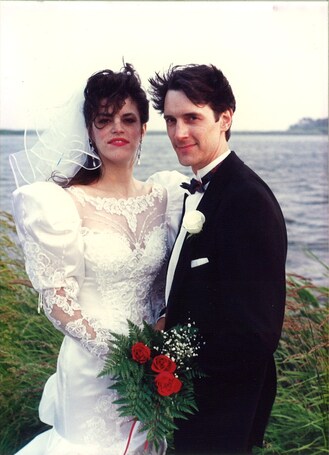 My marriage is 29 years old today. That age when you hope you’re focused on the right path, you’ve learned a thing or two, have some experience, you’re feeling more mature. That word that made you laugh a few years ago is here. But the big three zero looms around the corner, and when you hit that number you are really going to have to look back and assess what the hell you’ve done. This is the year you cross out of your youth into something much more serious, you’re that much closer to death. I was in hot pursuit of the career I wanted in my twenties, but if I’m honest, marriage has been my steady focus, the ball I never let hit the ground when the career ball at times hit with a thud. And it is only in the last few years that I’ve been able to confess this to myself -- a confession that has taken decades to coax out of my subconscious because it involves a lot of shame. I don’t have the career I dreamed of that includes money-making work and a large community, I have a body of work that I have made and a smaller group of people who know me and support me. And I have a 29 year old marriage. If we add the time before the legal document it’s really 33 years since those sweet early moments when our lives slid together without any real discussion, just moved forward by the forces within both of us that suddenly felt heard and seen by the other. It began in the theater at the University of Colorado at Denver talking to him in classes with ease, surprised by his thoughts, his point of view, his understanding, surprised that I could move my way in and through what he expressed and find my own voice expanded and appreciated. Surprised how my breathing slowed down as I settled into one of those black metal chairs on the risers in the theater next to him listening to the professor -- such a lovely place to be. Belonging. The most powerful elixir I know. 29 years of making theater together, packing it all up to move across the country, chase the dream, don’t look back, graduate school in New England, petty petty painful theater-people shit, another big push to land in New York City, throw ourselves at auditions, stand in line at Equity open calls at 6:00 a.m., rejection, rejection, rejection, find day jobs, stare into restaurant windows obsessively, look around us at the quintessential NYC life and wonder if we’d ever crack the code, start a theater company, make many beautiful shows, get pregnant because it’s getting to be that time, miscarriage, the summer of grief and endless episodes of Law & Order, get pregnant again – Oh Dear Lord, stop everything – just look at her. Get going again, he walks away from the theater, it’s unfulfilling, he stares the beast directly in the eye and calls a truce, he’s going to do something else, move to the Bronx, another summer of grief, is the NYC dream gone, get pregnant again – stop – see, how extraordinary. Getting through those early days with small kids, nothing cool and sexy about it, just day in and day out. It’s an odd mix of routine and discipline, while watching two beautiful creatures come into their own. Surviving the years of brutal fights where it all comes out, every hidden criticism, every thwarted desire, every mean truth, you say it all, and it almost breaks everything. 29 years of sitting on the bed every morning drinking hot black coffee talking, working it out, having it out, hoping, planning. Did any of what we said really matter or is the fact of the sitting the point. Have I been a good partner? I don’t honestly know if I can answer that or if it matters. I know I have been ... a partner. I have been a part of this thing and the ball never hit the ground with a thud, came oh so close many times, but that’s life I think. I chose this partner thing, this marriage thing, this kind of life thing. And in choosing that I didn’t always see myself clearly and make what I thought I wanted with my life, a bigger life with a bigger career. But maybe 29 years in, what this soul of mine lurking here in this body, really wanted, needed, to self-actualize herself and put another foot forward in this plane of existence was exactly what I did, not what I thought I should be doing. So maybe, 29 years in, I can loosen the lid on the shame jar and let a little bit of it go. And breathe in this partnership, this person, who all these years on still makes room for my voice to expand. 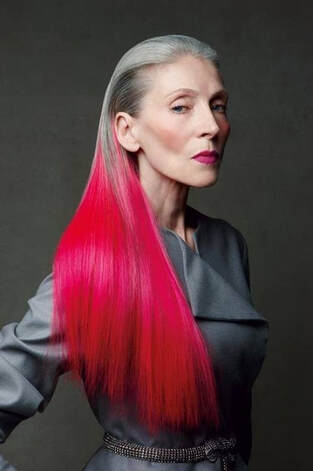 Maybe not dying my hair would be as bold as jumping out of an airplane which I would never do, terrified, but it would be my way of being bold, walking down the street gray-haired and feeling beautiful. It would be my way to rebel against … the culture? Aging? Probably death. Maybe it would be my way of facing death. I think about dying all the time, and I think about not dying my hair anymore all the time. I've been doing it since my early 30's. I keep looking at pictures of women on line who look beautiful and have gray hair, wondering if that could be me, or will I just be a hag, a crone, gone, past. Dying my hair feels like I’m trying too hard and I try too hard at so many things, maybe this could be one thing I don’t have to try too hard at. It used to be easy, it used to be I had beautiful hair and I did nothing to it, I just had it, something I could count on. Always complimented on my hair and I could look up at the sky and sigh and feel a little guilty and weird for having something good and also smug and happy that I had something good. We’re in the middle of a pandemic and I’ve still been dying my own hair every three weeks. My husband helps me. That gray stripe that starts to appear is humiliating – an insistent reminder of the passage of time. I’M HERE, nothing you can do, but keep hiding -- hiding a big secret, a big lie, a big something. I don’t want to do it anymore. I want to be free, but I’m afraid. I want to stop fixing and just be. But who gets to do that? I made a pact this week with my 22 year old daughter to stop dying my hair in ten years. She already has some grays that stand out against her dark hair. When she’s 32 and wants to dye her hair and I’m … much older, we agreed she wouldn’t start and I would stop! Ten more years? We’ll see. 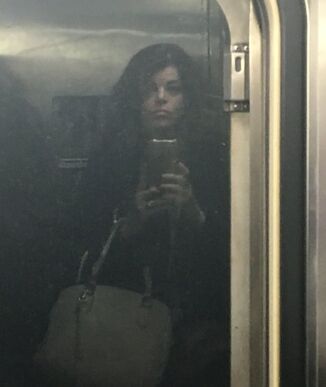 the 1 train - fall 2019 the 1 train - fall 2019 She stood in front of the mirror and wondered what other people saw. She checked the mirror so many times a day she couldn't count, didn't want to count. There was a mirror in her bedroom, of course the one in the bathroom, many times a day, and there was one in the hall. She glanced every time she walked by and as she spent most of her hours at home she walked by all the time. Sometimes she played a game to see if she could walk by without looking, impossible. She probably did walk by without looking sometimes, but she didn't realize it. And she probably walked by and looked and didn't realize it. She just needed to glance. Most reflective surfaces out in the world caught her rare bird's eye. How was she doing today? What were they seeing? Sometimes she saw the sad, older woman with the hanging jaw line and furrowed brow and stooped shoulders. The shoulders were the worst. You cannot stoop. Stop it. Sometimes she saw that silly girl who could never quite get her thick hair right, with all those freckles/spots, and that timid look. Sometimes, the lucky times, she saw the sparkling beauty. She'd catch her when she was dressed just so and she was hurrying past the mirror and then oh, she would stop and take it all in and wonder to herself, "Where have you been?! I've been looking at that crone for weeks, so unpleasant." And the sparkling beauty would smile wryly, put her hand on her hip and her chin up and say, "I have to go, so much to do." And then the girl would stand there with her messy hair and dark eyes and weird moods and try to call the sparkling beauty back, but she was gone, whisked away. The crone would laugh at the girl, "What did you expect? She's not sticking around. She's not one of us." The girl would get so angry she couldn't speak, tears would well up and she would whisper, "Yes, I am like her, I am a sparkling beauty, I am! No one knows it yet." Of course underneath lurked the nagging thought what if all this thinking about what people thought of her and her specialness and what she should do with it had been a waste of time? What should she have been thinking about ... good works and duties and tasks? Oh, there she is again. Her eyes looked pretty today, dressed up with lots of colors and black hard lines and sticky eyelashes. She loved the seriousness that always came back at her, stern, mysterious. Sometimes it made her want to smash her face though. Wait. She was going to think about other things, not herself, things that matter in the world outside. 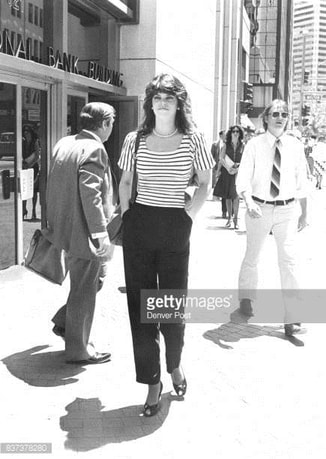 1980's Denver steno pad days - walking down 17th St. on my lunch hour stopped by a Denver Post photographer asking me if he could take a pic, they were doing a feature on black and white clothing 1980's Denver steno pad days - walking down 17th St. on my lunch hour stopped by a Denver Post photographer asking me if he could take a pic, they were doing a feature on black and white clothing ----------- I bought a steno pad in the grocery store a few days ago while I was quickly shopping, grabbing essentials, trying to spend as little time in the store as possible, and not inhale or exhale toward anyone. And don’t touch your face, asshole! (I like to use little extra motivating words on myself.) I wanted that steno pad right away the second I saw it. Is that an essential? No. I wanted to grab it and put it under my arm and walk away from my cart and all the breathing people around me and do something new. First, I never buy office shit in the grocery store, it’s weird. Second, this isn’t the time. Third, I haven’t bought a steno pad for twenty plus years. I haven’t used one forever. I went through them fast when I worked in offices as a -- dirty word coming, secretary -- for years to support myself right after high school. Right after high school, job, apartment, steno pads . . . no discussion. It was better that way. I brought the grocery store steno pad home and it’s been empty on my desk for a few days now. But just this moment tonight, I am panicking. I have these attacks of anxiety, but it’s worse right now. So I am trying everything to stop it, thinking about the anxiety constantly, which of course doesn’t work, one cannot “stop it”, that’s not a thing, one must “accept one’s panic”. I’m terrible at that. So I’m pretending to myself that I am thinking about the park across the street, pretending I am having calming thoughts, ha, sitting by the window, breathing, not breathing, counting my breaths, counting my pulse, nothing working and then I notice my cat, Olive, staring at me, so I start staring back. I have lived with Olive for four years now and I’m pretty convinced that when I’m at the end of my rope she is well aware. I am thinking about how she almost died twice and then . . . belief? rears its confusing head. (This belief thing has been knocking on my door for a few years now, but I’ve been a bit stand-offish.) As I stare at Olive, counting my breaths, I am having the thought slash belief that she didn’t die because we’re not done yet, me and Olive . . . what is that . . . faith, what’s happening? The desperate cries of a woman with chronic anxiety living in a new world now that is feeding that anxiety like a fire hose sending messages -- you were right, Linda, it is all a disaster. That same feeling I had at six-years-old, frozen in my memory, sitting in front of the TV, hearing my parent’s voices upstairs, and suddenly knowing, like I was a jaded forty-year-old, this is all there is -- and then feeling my stomach drop out onto the floor, but then willing my brain to go back to being six-years-old and just watch the damn TV stupid, you’re a kid, you don’t know shit . . . . But what’s up now panicky Linda? Are you believing in something because you actually believe in something? Or is this where panic takes you, Cat Belief?! Olive's eyes still burrowing deep into mine. (She knows I'm a mess.) And then an idea fully coalesces and I run to my desk, making my heart beat even more uncomfortably faster, and I write it down in my steno pad. It is my current pad. I always have a pad I write notes in and things to do, but it’s mostly been spiral notebooks, smaller ones. I have a small desk so a large spiral would feel like too much. I have a small desk because I live in New York and space is at a premium, because I had to chase my dream and live in New York! Great idea. I write this new thought I am having as fast as I can in my new steno pad, and it's a mess. My handwriting is big and loopy and tense. I think this thing that made me leap to my steno pad belongs in one of my old plays, I think it might be a better ending than the one I currently have. But I also think this thing/thought/idea belongs in my life. I’m still panicking, everything I think makes me panic, but the idea is getting bigger and longer so now I’m typing it on my computer because my typing fingers are faster than my steno pad writing fingers and the thoughts are coming fast and I no longer trust my memory to hold shit so I’m typing as fast as I can, and my husband says he’s making food do I want some, and I wish he’d not talk right now, and I wish I could stop the panic. But I’m also a little bit proud of myself than in the midst of my panic, I had a really clear solid, beautiful idea that I like, that is wound up in faith and love and feeling like I need to let it all in, everything that is happening. Maybe this is all I can do, write stuff, get it all out of me, say it. This is clearly not a time to hold back. ------------------------
It’s my mother’s 85th birthday. She’s far away in Colorado and she’s far away … she’s had Alzheimer’s for a few years now. I can’t call, she doesn’t know me, and there is nothing to say at this point. She and I haven’t had it smooth … she always looked at me a little circumspect from the time I can remember, who is this odd duck living in my house, a little too loud, a little too demanding, a little too, too. She was brought up by Swiss immigrant farmers in the northwest, Idaho. She valued practicality and austerity, two qualities I just never took up. But her influence got in, her fears, her cautiousness, her modesty, so that when I moved outside the lines I got confused … still do. Should I go this way or that? Should I follow this impulse I’m feeling or think about it some more. -- Mothering. Do any of us get it right? -- My birthday (I was induced so is it really my birthday?) is on the cusp of Leo and Virgo, am I this or that, or neither? I’m holding my breath writing this trying not to feel, not to feel so lousy that she is going out this way, that there will never be any resolve between her and I, any more conversation, any more understanding. My fear is she knew me and she really didn’t like me, so there was no place for us to go anyway, no more understanding to be had, even if we had all the time in the world. She laughed hard at my jokes. I was good at making her laugh with my point of view on things, a little audacious for her taste, but funny. I was standing in a parking lot years ago, flirting with a man I had a crush on, and out of nowhere he asks me, “Are you an orphan?” I just stood there, silent. “You sure act like one.” Huh. No one had ever said that to me before but he was seeing pretty far in for someone who barely knew me. I’ve got a mom. She’s 85 today, that is a life, a big one. When I was younger I thought a big life meant big things attained, big things that could be seen and checked off a list. Now that I am well into middle age I know better. Everybody’s life is big. |
Authorplaywright/screenwriter/actor Archives
October 2023
Categories |
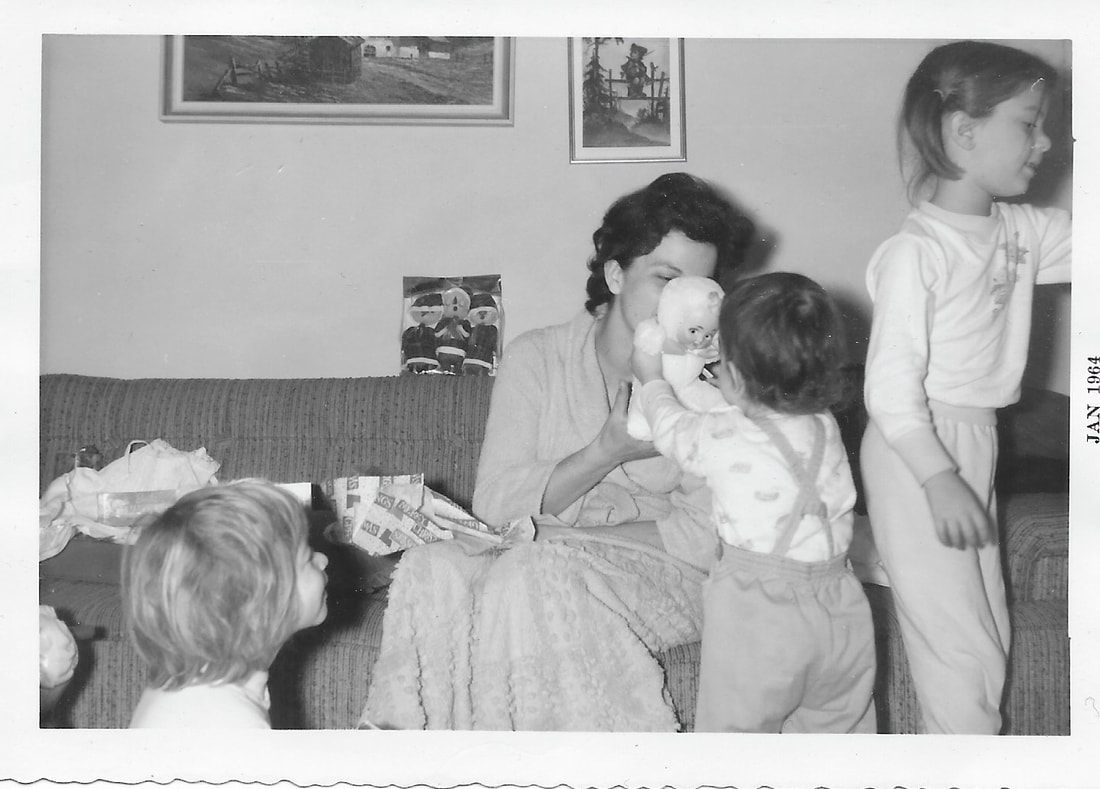
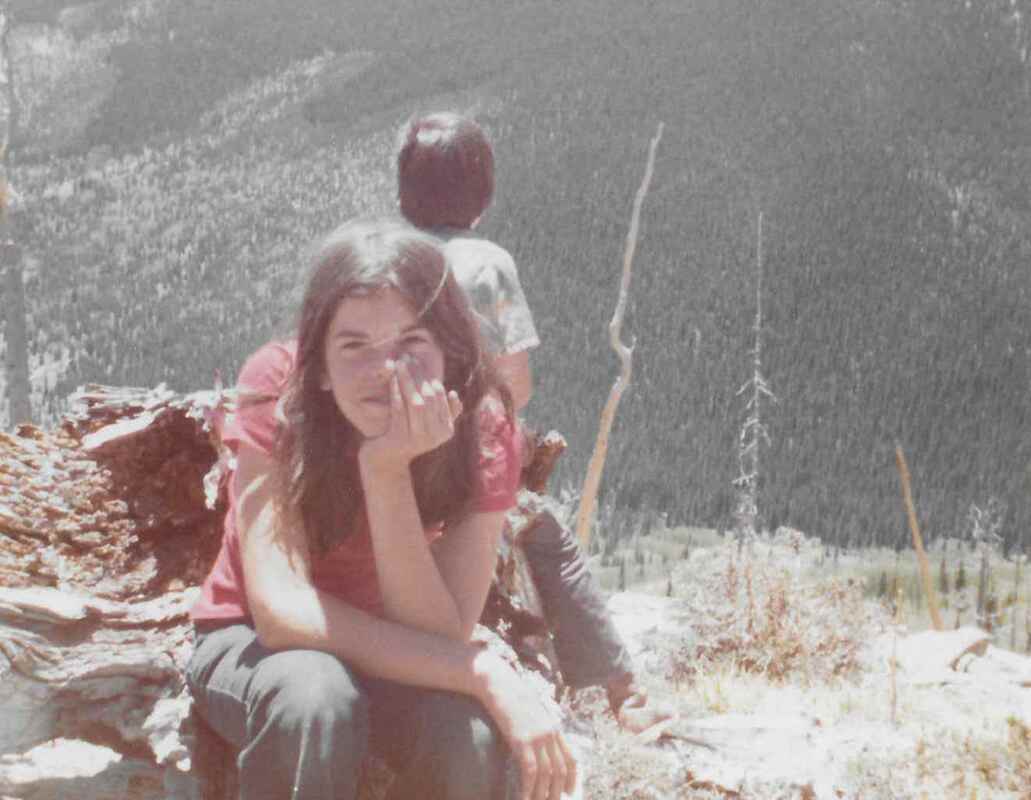
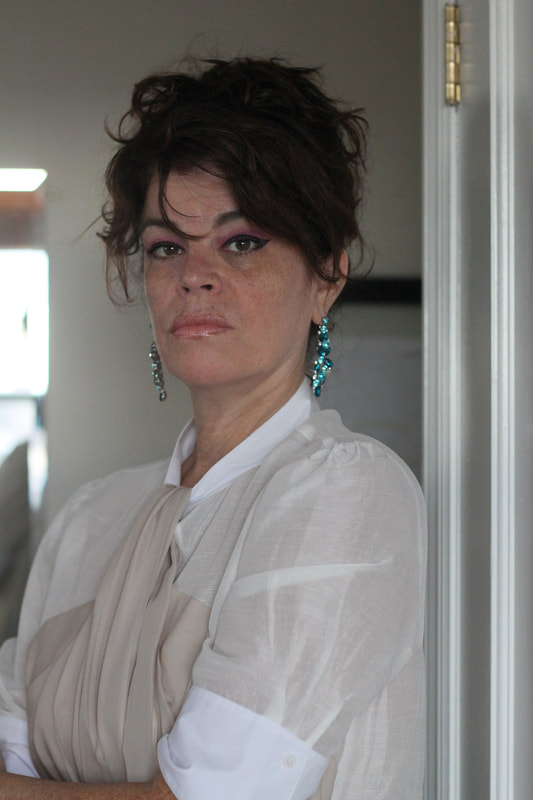
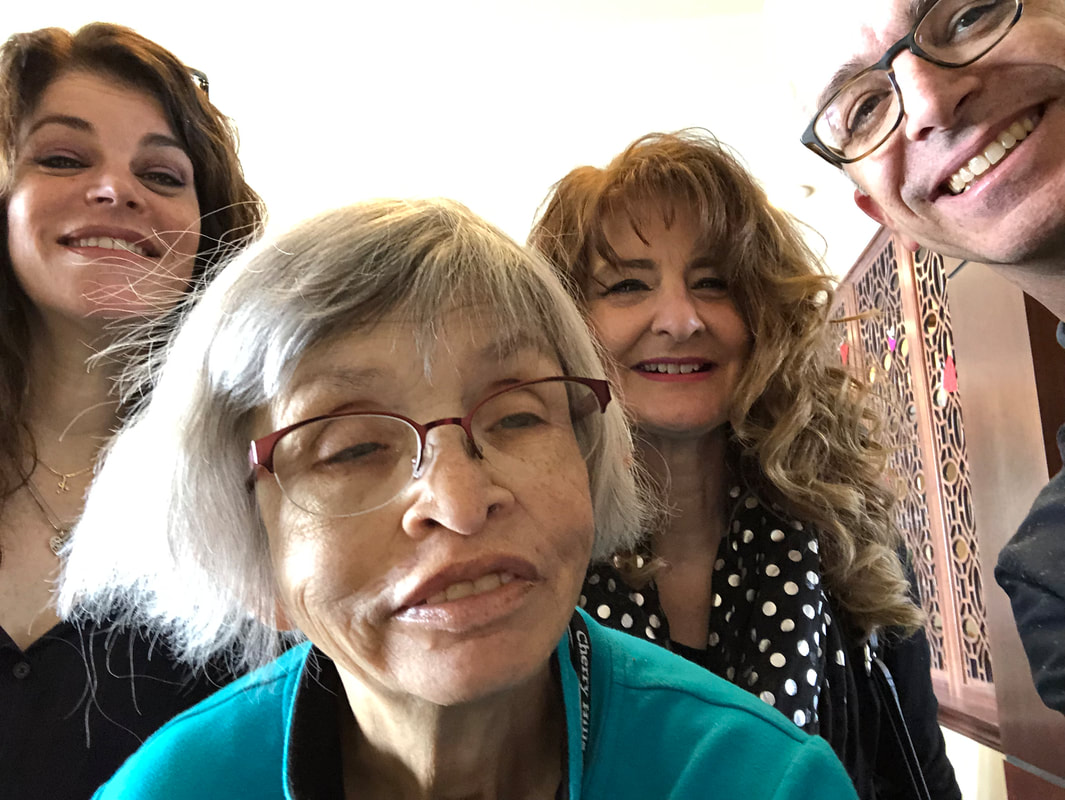
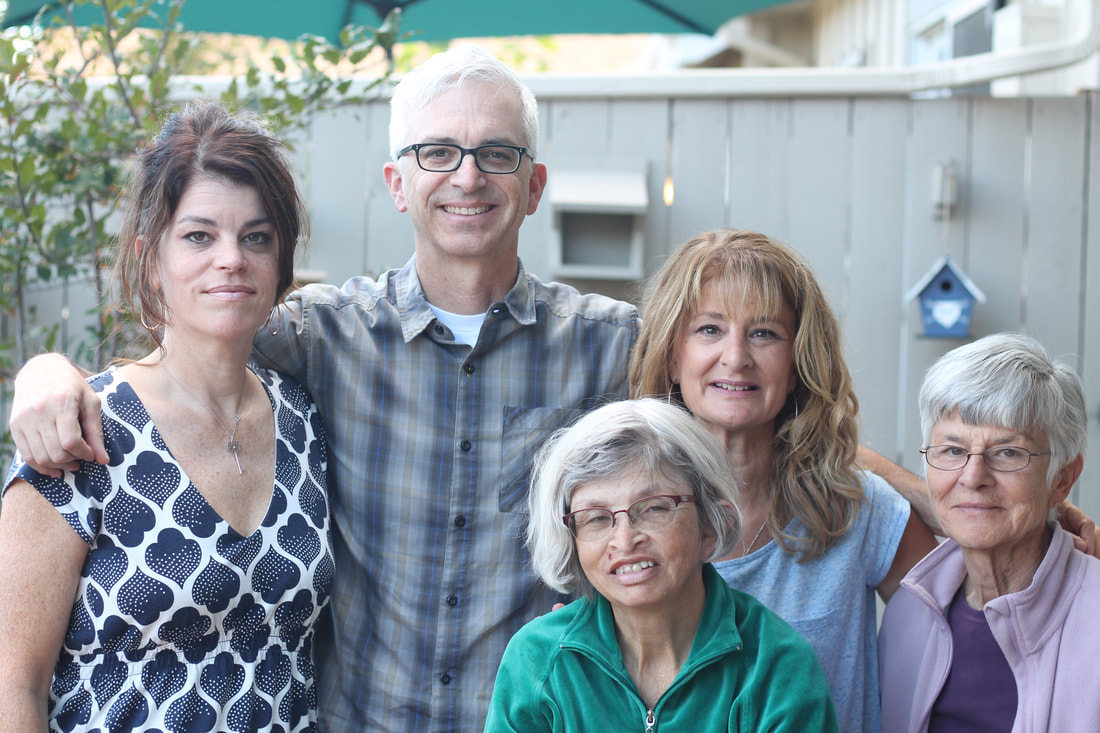
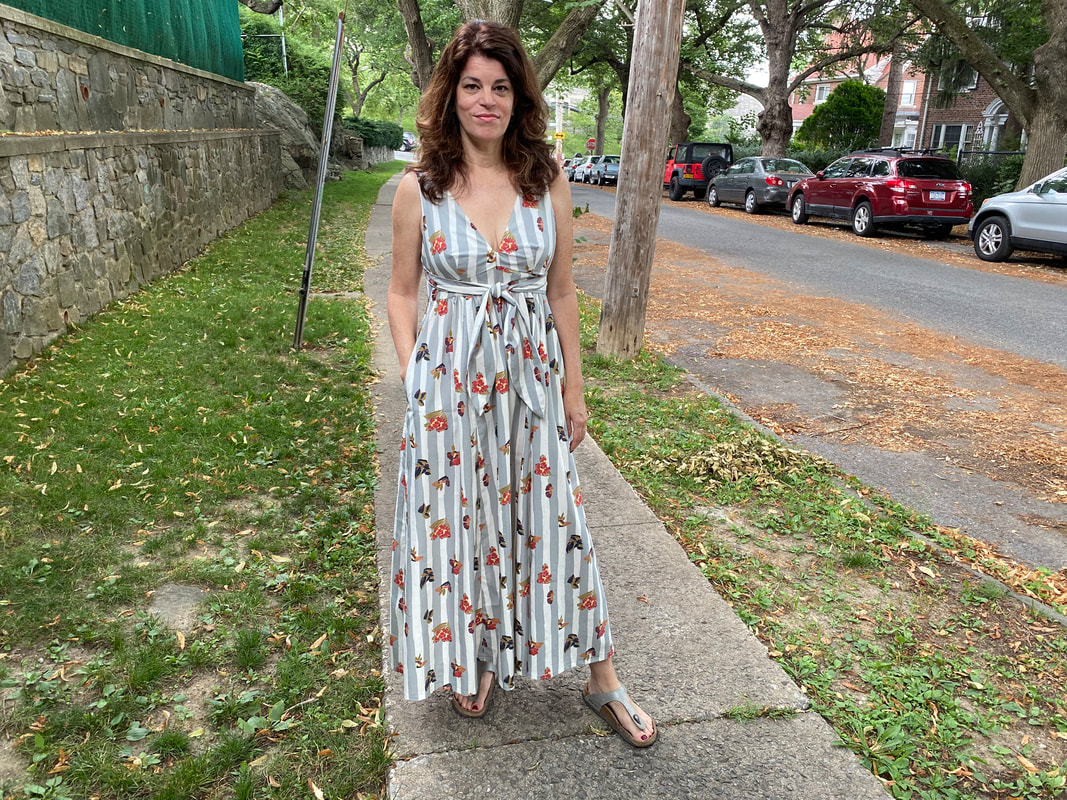
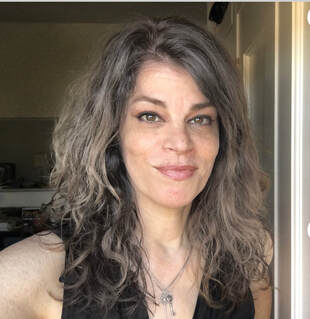
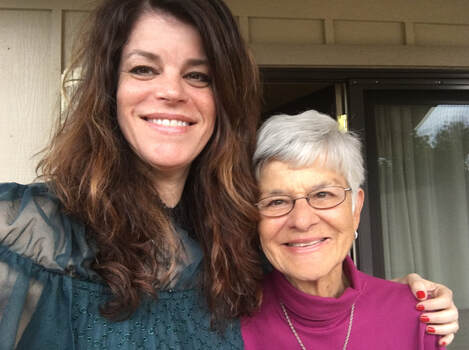
 RSS Feed
RSS Feed